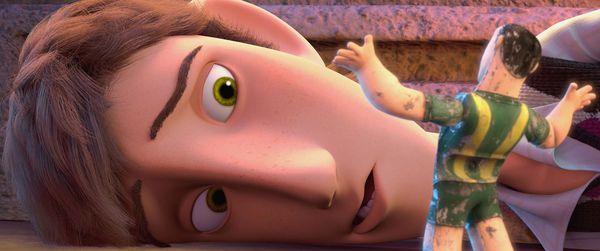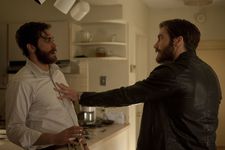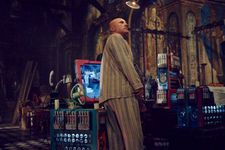 |
| Juan José Campanella’s animation Futbolin with open San Sebastian Film Festival. |
And there's no doubt that festival director Juan Luis Rebordinos and his team know a crowd-pleaser when they see one kicking off the festival with the international premiere of Juan Jose Campanella's delightful Foosball (known as Futbolin in Spain and Metegol in Argentina). It was a great feel-good choice and, with an English dub of the film in the works, I wouldn't be at all surprised to see it make its way to the animation category of the Oscars next year. It certainly deserves too, as it boasts considerably more charm than the likes than recent Spanish offering Justin And The Knights Of Valour an even Monsters University,and has its own distinctive sense of humour.
Foosball's protagonist Amadeo can control a table football game like no other and idea of control - and particularly, the lack of it - have permeated several of the films I've seen out here so far. Even the salad at the opening night gala party came fully 'controlled' in a little orb all of its own, which posed an interesting Krypton Factor style challenge to the assembled celebrities, who were trying to break into them at the same time as juggling a glass of wine.
 |
| Jake Gyllenhaal sees double in Denis Villeneuve's Enemy |
He plays history teacher Adam Bell, whose boot polish brown hair and bushy beard stand out against cinematographer Nicolas Bolduc's jaundiced backdrop, which in turn, emanates sickness and melancholy. When Adam spots a man who looks exactly like him playing a bit part in a movie, Where There's A Will There's A Way, he decides to track him down and discovers that though actor Anthony looks and sounds exactly like him, he is the ego to his id. Not unlike Sebastián Silva with Magic Magic earlier this year, Villenueve knows how to stoke the tension so that benign moments become first unsettling and then downright creepy. And, as the runtime extends, just as with Magic Magic, we begin to wonder just how trustworthy our protagonist is and whether he may be losing his mind. While Silva's film fell into hyperbole, however, Villeneuve is more restrained, although his film suffers from a lack of story - atmosphere can only take an audience so far on a journey. Still, when it comes to tension, the director- aided by a very fine score from Danny Bensi and Saunder Jurriaans - draws you into his web and delivers an ending that bites deep.
Sadly, it's a lack of bite that characterises Zero Theorem, the latest dystopian-drenched offering from Terry Gilliam. His central character also has control issues. Qohen Leth (Christoph Waltz) works for Mancom, a typically unpleasant Gilliam-style employer, who use their staff in the manner of sentient computer chips, challenging them to grind out complex problems in an computer-game style environment. Qohen is at least agorophobic and probably worse, struggling to find connection and obsessed with being at home so that he can receive a mysterious call which he thinks will end his woes. His life, then, is controlled by the company, while he can't get any sort of grip at all on his subconscious.
 |
| Christoph Waltz as Qohen Leth in The Zero Theorem |
Finally, then Hirokazu Kore-eda's beautiful and emotionally honest Like Father, Like Son (Soshite Chichi Ni Naru). Keita (Keita Ninomiya) is a bright six-year-old whose workaholic dad Ryota (Masaharu Fukuyama) likes control and order. He's not a bad man but he likes things to stay in place. So when the hospital where Keita was born call to say they need to set up a meeting, he tells his wife Midori (Machiko Ono - who more or less bends to his every whim - "I hope it's nothing messy."
 |
| San Sebastian salad orb... to stop those naughty leaves running off Photo: Amber Wilkinson |
Unlikely, Gilliam, Kore-eda gets properly down with the kids. As with I Wish, he captures their spirit, from the way in which they play with a life-or-death intensity, to the 'secret' lives they have that their parents often miss. He also knows how to control the pace of his films, so that his plot points have time to breathe; after he drops the bombshell of the child swap, he let's the intensity of the shock sink in with a silent scene of a car driving, a benign moment encouraging you to think about what you've just learned. Which brings me to my own lack of control. His film is of such an emotional intensity that I more or less cried throughout the entire second hour and I'm not ashamed to admit it.





















